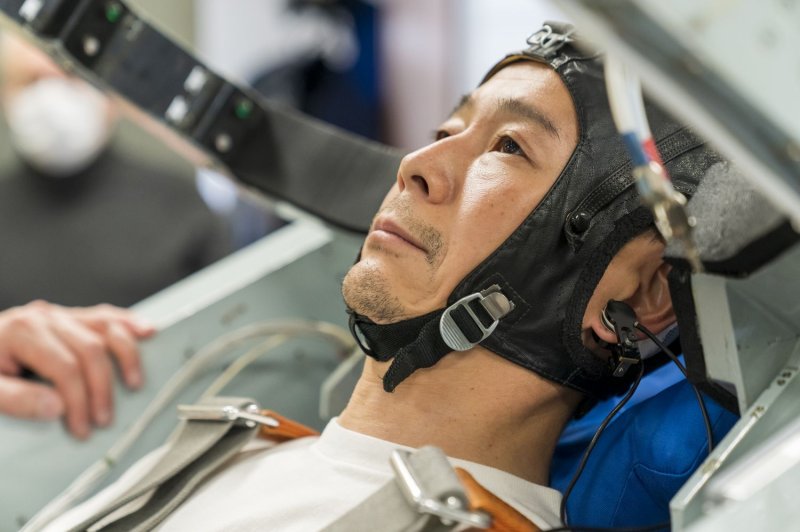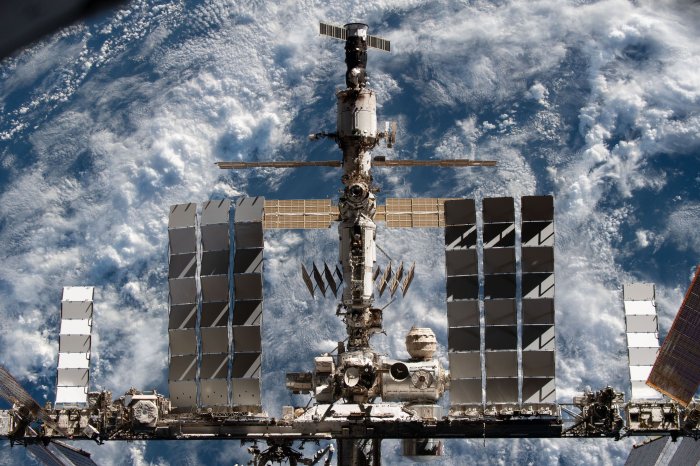MORE BILLIONAIRES IN SPACE
Japanese duo prepare for first tourist flight to space station since 2009By Paul Brinkmann

Japanese billionaire and space tourist Yusaku Maezawa trains for his space mission.
Photo courtesy of Roscosmos
Dec. 6 (UPI) -- Two Japanese businessmen plan to become the first paying tourists to visit the International Space Station since 2009 by rocketing into orbit from Kazakhstan on Wednesday.
Billionaire Yusaku Maezawa, who made his fortune in the fashion industry, booked seats for himself and his production assistant, Yozo Hirano, aboard a Russian Soyuz spacecraft through Virginia-based spacecraft broker Space Adventures.
Cosmonaut Alexander Misurkin will pilot the Soyuz during its flight to the space station and upon its return 12 days later. NASA plans to broadcast live video of the launch planned for 2:38 a.m. EST Wednesday.
The mission is part of a rapid expansion in space travel, Tom Shelley, president of Space Adventures, said in an interview.
RELATED Musk, Maezawa say moon mission is on track for 2023
"The general level of awareness and understanding of what it means to fly to space has increased particularly in the last two or three years," Shelley said.
Space Adventures booked eight private space flights on Russian rockets from 2001 to 2009, but the retirement of the space shuttle in 2011 led to a shortage of such flights.
The U.S. space program bought a large number of seats on Russian rockets since then, but the success of SpaceX Crew Dragon missions made more seats available, Shelley said.
RELATED NASA's SpaceX Crew-3 astronauts name their capsule Endurance

2 / 5From left to right, Soyuz MS-20 crew members Yozo Hirano, Russian cosmonaut Alexander Misurkin and Yusaku Maezawa try on their spacesuits.
Maezawa, 46, and Hirano, 36, have opened a new chapter in Space Adventure's business and in private space travel, he said.
"[Maezawa] has been fantastic. Some of the stuff he's sharing on social media about his training, and how to wear a spacesuit, I think that's been pretty unique," Shelley said.
For example, Maezawa posted a video of himself donning a Russian spacesuit, outlining many detailed steps that sometimes seemed quite awkward.
"I'll be careful when I go!" he said during the video, according to a translation. "For my actual launch, I'll be wearing my very own spacesuit, not like this one for training."
He added, "I'll be going to space Dec. 8, and I'll be uploading as many videos from the ISS as I can, so please keep an eye out for them."
Maezawa also booked a flight to orbit the moon in 2023 in a SpaceX Starship rocket, which is being developed. He announced in March that he sought, through a contest, eight people to fly with him, but he hasn't named the winners.
Maezawa's space station mission follows the all-private orbital Inspiration4 spaceflight in September, when four civilians circled the Earth in a SpaceX capsule.
That mission, arranged by billionaire Jared Isaacman, drew attention through coverage in a Netflix miniseries and a fundraising campaign for Memphis-based St. Jude Children's Research Hospital.

From left to right, Soyuz MS-20 crew members Yozo Hirano, Russian cosmonaut Alexander Misurkin and Yusaku Maezawa pose for a photo during training.
Neither Maezawa nor Space Adventures has disclosed how much he is paying for the two seats, but NASA had been paying about $80 million for a seat in recent years.
Despite the cost, such private missions ultimately help to expand the market for spaceflight, which should someday drive down prices, said John Spencer, a space architect and founder of the nonprofit Space Tourism Society.
"Maezawa is serious about pioneering space experiences for people, and also about talking more about the view of Earth from space, how that changes people, and the meaning of humanity moving outward," Spencer said in an interview.
Training with Russia's space program is intense, but necessary, Spencer said, because private space tourists must be able to respond in an emergency.
"If you really freak out during training, during a zero gravity flight or on the spinning chair centrifuge, you're not going to fly," he said.
"So when you have people who step up, like this guy, and they're willing to put their money and lives on the line -- that's important."

The International Space Station is pictured from the SpaceX Crew Dragon Endeavour during a flyaround of the orbiting lab that took place following its undocking from the Harmony module’s space-facing port on November 8. Photo courtesy of NASA
Dec. 6 (UPI) -- Two Japanese businessmen plan to become the first paying tourists to visit the International Space Station since 2009 by rocketing into orbit from Kazakhstan on Wednesday.
Billionaire Yusaku Maezawa, who made his fortune in the fashion industry, booked seats for himself and his production assistant, Yozo Hirano, aboard a Russian Soyuz spacecraft through Virginia-based spacecraft broker Space Adventures.
Cosmonaut Alexander Misurkin will pilot the Soyuz during its flight to the space station and upon its return 12 days later. NASA plans to broadcast live video of the launch planned for 2:38 a.m. EST Wednesday.
The mission is part of a rapid expansion in space travel, Tom Shelley, president of Space Adventures, said in an interview.
RELATED Musk, Maezawa say moon mission is on track for 2023
"The general level of awareness and understanding of what it means to fly to space has increased particularly in the last two or three years," Shelley said.
Space Adventures booked eight private space flights on Russian rockets from 2001 to 2009, but the retirement of the space shuttle in 2011 led to a shortage of such flights.
The U.S. space program bought a large number of seats on Russian rockets since then, but the success of SpaceX Crew Dragon missions made more seats available, Shelley said.
RELATED NASA's SpaceX Crew-3 astronauts name their capsule Endurance

2 / 5From left to right, Soyuz MS-20 crew members Yozo Hirano, Russian cosmonaut Alexander Misurkin and Yusaku Maezawa try on their spacesuits.
Photo courtesy of Roscosmos
Maezawa, 46, and Hirano, 36, have opened a new chapter in Space Adventure's business and in private space travel, he said.
"[Maezawa] has been fantastic. Some of the stuff he's sharing on social media about his training, and how to wear a spacesuit, I think that's been pretty unique," Shelley said.
For example, Maezawa posted a video of himself donning a Russian spacesuit, outlining many detailed steps that sometimes seemed quite awkward.
"I'll be careful when I go!" he said during the video, according to a translation. "For my actual launch, I'll be wearing my very own spacesuit, not like this one for training."
He added, "I'll be going to space Dec. 8, and I'll be uploading as many videos from the ISS as I can, so please keep an eye out for them."
Maezawa also booked a flight to orbit the moon in 2023 in a SpaceX Starship rocket, which is being developed. He announced in March that he sought, through a contest, eight people to fly with him, but he hasn't named the winners.
Maezawa's space station mission follows the all-private orbital Inspiration4 spaceflight in September, when four civilians circled the Earth in a SpaceX capsule.
That mission, arranged by billionaire Jared Isaacman, drew attention through coverage in a Netflix miniseries and a fundraising campaign for Memphis-based St. Jude Children's Research Hospital.

From left to right, Soyuz MS-20 crew members Yozo Hirano, Russian cosmonaut Alexander Misurkin and Yusaku Maezawa pose for a photo during training.
Photo courtesy of Roscosmos
Russia also sent two private citizens to the space station in October to film a movie, in a mission that was partly sponsored by its space agency Roscosmos.Neither Maezawa nor Space Adventures has disclosed how much he is paying for the two seats, but NASA had been paying about $80 million for a seat in recent years.
Despite the cost, such private missions ultimately help to expand the market for spaceflight, which should someday drive down prices, said John Spencer, a space architect and founder of the nonprofit Space Tourism Society.
"Maezawa is serious about pioneering space experiences for people, and also about talking more about the view of Earth from space, how that changes people, and the meaning of humanity moving outward," Spencer said in an interview.
Training with Russia's space program is intense, but necessary, Spencer said, because private space tourists must be able to respond in an emergency.
"If you really freak out during training, during a zero gravity flight or on the spinning chair centrifuge, you're not going to fly," he said.
"So when you have people who step up, like this guy, and they're willing to put their money and lives on the line -- that's important."

The International Space Station is pictured from the SpaceX Crew Dragon Endeavour during a flyaround of the orbiting lab that took place following its undocking from the Harmony module’s space-facing port on November 8. Photo courtesy of NASA
No comments:
Post a Comment